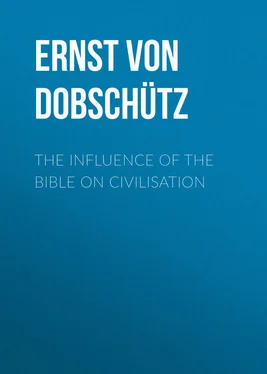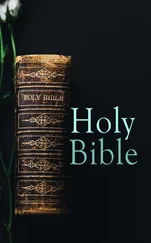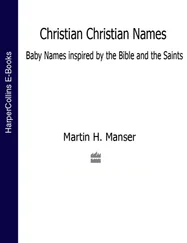Ernst Dobschütz - The Influence of the Bible on Civilisation
Здесь есть возможность читать онлайн «Ernst Dobschütz - The Influence of the Bible on Civilisation» — ознакомительный отрывок электронной книги совершенно бесплатно, а после прочтения отрывка купить полную версию. В некоторых случаях можно слушать аудио, скачать через торрент в формате fb2 и присутствует краткое содержание. Жанр: foreign_religion, foreign_antique, foreign_prose, на английском языке. Описание произведения, (предисловие) а так же отзывы посетителей доступны на портале библиотеки ЛибКат.
- Название:The Influence of the Bible on Civilisation
- Автор:
- Жанр:
- Год:неизвестен
- ISBN:нет данных
- Рейтинг книги:3 / 5. Голосов: 1
-
Избранное:Добавить в избранное
- Отзывы:
-
Ваша оценка:
- 60
- 1
- 2
- 3
- 4
- 5
The Influence of the Bible on Civilisation: краткое содержание, описание и аннотация
Предлагаем к чтению аннотацию, описание, краткое содержание или предисловие (зависит от того, что написал сам автор книги «The Influence of the Bible on Civilisation»). Если вы не нашли необходимую информацию о книге — напишите в комментариях, мы постараемся отыскать её.
The Influence of the Bible on Civilisation — читать онлайн ознакомительный отрывок
Ниже представлен текст книги, разбитый по страницам. Система сохранения места последней прочитанной страницы, позволяет с удобством читать онлайн бесплатно книгу «The Influence of the Bible on Civilisation», без необходимости каждый раз заново искать на чём Вы остановились. Поставьте закладку, и сможете в любой момент перейти на страницу, на которой закончили чтение.
Интервал:
Закладка:
To us this system of Biblical references for everything in the Christian service seems strange. We feel that the worship of the Christian congregation rests on other principles than the ritual of the Old Testament and does not gain anything by such hazardous comparisons. It looks like comparing the stars in heaven with beasts on earth. But the fathers thought that this was the highest achievement at which they could arrive: to allegorise and spiritualise the Old Testament law in order to deduce from it the Christian liturgy. That was what they called worship in spirit and truth. It is exactly opposite to the great idea which Jesus conveyed in those words; it is one of the greatest confusions to which the juxtaposition of the Old and the New Testament in one Bible was leading. Nevertheless, it was of great influence upon civilisation for centuries.
The church and the laity were ruled by the Bible; but the real Bible folk of this time were the monks. There had been a tendency toward asceticism from the very beginning of Christianity. At the moment when the church came into power this tendency increased rapidly. In Egypt as well as in Syria, wherever there was a desert place hermits gathered and monasteries were built. Now, in these monasteries the life was really filled with the reading of the Bible. Even the poorest monk would have a copy of the Gospels to read. Some of the monks, of course, were very simple, unlearned people. They could not read, so they learned it all by heart. And sometimes – we are told in the legendary tales of the monks – it happened that a monk who never before had learned to read was miraculously given the art of reading, God granting it to him as a recompense for his zeal. The monks had their hours for common worship and reading, but they were supposed to read each by himself as much as possible. "The rising sun shall find the Bible in thy hands," is one of the monastic rules, and legend illustrates how the divine grace recompensed assiduous reading: filled with heavenly light all through the night was the cell of a hermit as long as he was reading the Bible. When visitors came the talk was over questions raised by the Bible. It was with quotations from the Bible that the celebrated anchorite entertained the people who called upon him to ask for spiritual help.
Among all Biblical books the Psalter was the one most favoured by the monks. They knew it by heart, almost all of them, and they used to recite it during their manual labour. The Psalter was their spiritual weapon against the temptations of the demons; the demon liked nothing so much as to turn a monk from reciting his Psalter. But besides the Psalter it was the Gospel which prevailed over all other books in these ascetic circles. Many of the hermits were induced to leave the world by attending a Gospel lesson in their church at home. "If thou wouldest be perfect, go, sell that thou hast and give to the poor, and thou shalt have treasure in heaven: and come follow me," or "And every one that hath left houses or brethren or sisters or father or mother or children or lands for my name's sake shall receive a hundredfold and shall inherit eternal life." These are the words which occur again and again in the lives of saints as the decisive ones for their "conversion," that is for leaving the world and going to the desert or entering a monastery. The first saying quoted above is referred to in the life of Saint Anthony, the greatest of all hermits, and Saint Augustine had this in his mind when the time came for him to change his life. The second saying makes Saint Hypatius go away from home; his biographer, however, is honest enough to add that the saint, a youth of eighteen, had just received punishment from his father. An actor living luxuriously with two concubines chances to enter a church, and hears read from the Gospel, "Repent ye, for the kingdom of heaven is at hand"; so he repents and becomes a monk. I do not mean to say that these tales of the monks are historical and trustworthy in every point, but I venture to think that this statement about the motives for conversion is, after all, a correct one. The gospel is what appeals to the human heart, in all centuries and in all nations. And then the man will try to make the gospel the rule of his life. I think it is remarkable that whereas the church and the empire both were ruled mainly by the Old Testament, these ascetic circles took the gospel as their main rule, that is to say, the gospel as understood by the men of that time. It was to them a new law, a law of asceticism, of self-denial, and they kept to it as strictly as possible. Even if for other Christians it meant an almost inaccessible ideal, the monastery ought to be the place to fulfil it literally.
Our picture would be inadequate, however, if we should neglect the abuse of the Bible, the Bible showing its importance and ruling force even by its influence upon the dark domain of human superstition. The ancient world was full of magic. We remember the story in Acts 19 of how Saint Paul overcame some Jewish exorcists, with the result that "not a few of them that practised curious arts brought their books together and burned them in the sight of all, and they counted the price of them and found it fifty thousand pieces of silver." I suspect many a scholar or librarian of to-day would like very much to have those books among his treasures, but they were burned; and Christianity scored its first triumph over superstition. Superstition, however, did not give way at this first defeat; on the contrary, it made a strenuous effort to draw over all the forces of Christendom to its own side. There was the name of Jesus, frightening the demons; black magic took this name and converted it to its detestable uses. There was the Gospel, representative of Jesus himself in his heavenly power; superstition made it a vehicle of its own magical rites. There was the Bible, the book of divine oracles; human inquisitiveness turned it into a book from which to read the dark future. The heathen had done this with the poems of Homer and Vergil. Turning over the pages they suddenly stopped at a verse and then tried to find in this verse the answer to their question. The fathers of the early church detested this method as something quite alien to a Christian mind, but as early as the end of the fourth century people came to feel that it was all right if only they used the Bible for the same purpose. In the sixth century even church officials kept to this practice. When a bishop had to be elected they almost always consulted the Psalter first on behalf of the man to be elected. Bible verses written on parchment were attached to easy chairs in order to keep away the evil spirits. Gospels in the smallest form were hung on the necks of the babies. It is astonishing to see how great was the esteem in which the Bible was held and how terribly contrary to the spirit of the Bible this practice was, especially when the Bible was used to do harm. Lead, by its dull lustre, always has reminded mankind of the realm of death; so it was used in black magic for bringing upon an enemy a curse from the gods of the underworld. A rolled sheet of lead, inscribed with a psalm and a dreadful curse against any robber, has been found on one of the Ægean Islands hidden in the ground of a vineyard. Evidently the psalm was supposed to be one of the most effective spells. Even the Lord's Prayer and other parts of the Gospels have been abused in the same way (Plate VII). Nothing is so holy that it cannot be turned into a crime by human sin.
It is a dark page of human civilisation. I am afraid it is a large page, too. I could accumulate instance upon instance. But however interesting this might be, it would give a wrong impression. The Bible was not primarily used as a magical means in those centuries. It was acknowledged as something superhuman, bearing supernatural powers, and therefore ruling everything. It ruled the empire as well as the church. It influenced law, language, art, habits, and even magic.
Читать дальшеИнтервал:
Закладка:
Похожие книги на «The Influence of the Bible on Civilisation»
Представляем Вашему вниманию похожие книги на «The Influence of the Bible on Civilisation» списком для выбора. Мы отобрали схожую по названию и смыслу литературу в надежде предоставить читателям больше вариантов отыскать новые, интересные, ещё непрочитанные произведения.
Обсуждение, отзывы о книге «The Influence of the Bible on Civilisation» и просто собственные мнения читателей. Оставьте ваши комментарии, напишите, что Вы думаете о произведении, его смысле или главных героях. Укажите что конкретно понравилось, а что нет, и почему Вы так считаете.












